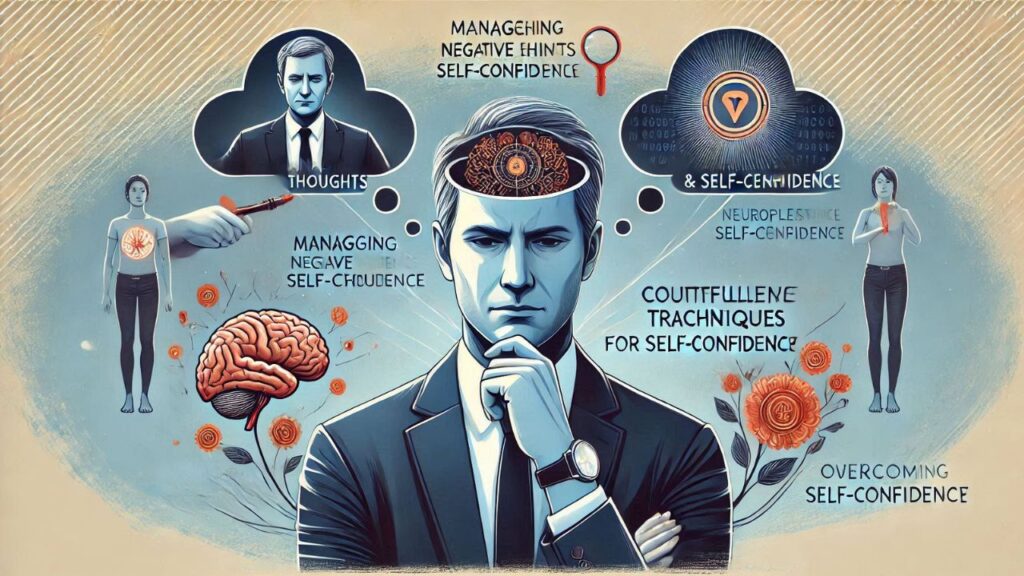Managing negative thoughts to strengthen self-confidence is a crucial step toward fostering a healthy and empowered mindset.
Negative thoughts can undermine our belief in ourselves and limit our potential, but understanding their origins and addressing them effectively can transform the way we view ourselves and the world around us.
Identifying Common Sources of Negative Thoughts and Their Triggers.
Negative thoughts often arise from various sources, such as past experiences, societal pressures, and personal insecurities.
Common triggers include failure, criticism, and comparison to others.
For instance, a negative comment from a colleague or a past failure in achieving a goal might activate a cycle of self-doubt.
Recognizing these triggers is the first step toward breaking the cycle of negativity.
The Psychological Impact of Constant Negative Thinking.
Persistent negative thinking can lead to a host of psychological challenges, including anxiety, depression, and low self-esteem.
When we focus excessively on our flaws and shortcomings, we create a distorted self-image, which affects our ability to set and achieve goals.
This cycle can also impair relationships and hinder personal growth.
How Past Experiences Shape Our Self-Perception.
Past experiences, particularly those rooted in childhood, play a significant role in shaping self-perception. For instance, a history of criticism or lack of support can instill limiting beliefs about one’s abilities.
These beliefs often manifest as negative self-talk, perpetuating a narrative of inadequacy. By examining these experiences, individuals can begin to dismantle harmful beliefs and reframe their perspectives.
Recognizing Patterns of Negative Self-Talk in Daily Life.
Negative self-talk is often automatic and habitual. It might appear in the form of statements like “I’m not good enough” or “I always fail.”
Paying attention to these patterns is essential for disrupting them.
Journaling or self-reflection can help identify recurring thoughts, making it easier to address them constructively.

The Role of Neuroscience in Shaping Thoughts and Self-Confidence.
How the Brain Processes Negative and Positive Stimuli.
The brain is naturally wired to focus on negative stimuli more than positive ones—a phenomenon known as the negativity bias.
This bias, while evolutionary in origin, can perpetuate negative thought patterns if left unchecked.
Recognizing this tendency allows individuals to consciously redirect their focus toward positive experiences and outcomes.
The Impact of Neuroplasticity on Developing Healthier Thought Patterns.
Neuroplasticity, the brain’s ability to reorganize itself by forming new neural connections, offers hope for those struggling with negative thinking.
By consistently practicing positive thought patterns and reframing negative beliefs, individuals can reshape their neural pathways, fostering a more confident and optimistic mindset.
Understanding the Mind-Body Connection in Self-Confidence.
The connection between the mind and body plays a critical role in self-confidence.
For example, engaging in regular physical activity or practicing deep breathing can reduce stress and promote a sense of well-being.
This, in turn, supports a positive mental state, reinforcing healthy thought patterns.
Exploring Scientific Studies on Mindset Shifts.
Research has shown that mindset shifts can have a profound impact on confidence and resilience.
Studies on growth mindset, for instance, highlight the importance of viewing challenges as opportunities for growth rather than as obstacles.
Embracing such perspectives can significantly enhance self-belief.

Effective Strategies for Managing Negative Thoughts.
Mindfulness Techniques to Stay Present and Grounded.
Mindfulness practices, such as meditation and grounding exercises, can help individuals remain present and detach from negative thoughts.
By focusing on the present moment, it becomes easier to observe thoughts without judgment and prevent them from spiraling out of control.
Cognitive-Behavioral Strategies to Reframe Negative Thoughts.
Cognitive-behavioral techniques, such as challenging cognitive distortions and replacing them with balanced thoughts, are highly effective.
For example, instead of thinking, “I always fail,” one might reframe it as, “I’ve faced challenges before and learned from them.”
The Power of Affirmations and Visualization for Positive Thinking.
Affirmations and visualization are powerful tools for cultivating a positive mindset.
Regularly affirming statements like “I am capable” or visualizing successful outcomes can reinforce self-confidence and help override negative beliefs.
Setting Realistic Goals to Challenge Harmful Beliefs.
Setting and achieving realistic goals can help counteract harmful beliefs. Small, attainable milestones build a sense of accomplishment, gradually reinforcing the belief that larger goals are also within reach.
Building and Sustaining Long-Term Self-Confidence
How to Foster Self-Awareness and Self-Acceptance.
Self-awareness involves understanding one’s strengths, weaknesses, and thought patterns, while self-acceptance entails embracing oneself without judgment. Together, these practices create a foundation for enduring self-confidence.
The Importance of Nurturing a Supportive Environment.

Surrounding oneself with supportive individuals who encourage growth and positivity is essential.
A nurturing environment fosters resilience and provides a buffer against negativity.
Creating a Personal Development Plan for Continual Growth.
A personal development plan with clear goals and actionable steps ensures continuous progress. Regularly revisiting and adjusting this plan helps maintain focus and motivation.
Leveraging Community and External Resources for Accountability.
Engaging with communities or seeking mentorship can provide accountability and inspiration.
Whether through support groups, workshops, or professional guidance, external resources offer valuable perspectives and encouragement.
By understanding the roots of negative thoughts and implementing strategies to address them, individuals can cultivate a resilient and confident mindset.
Strengthening self-confidence is not a destination but a journey of self-discovery and growth.

